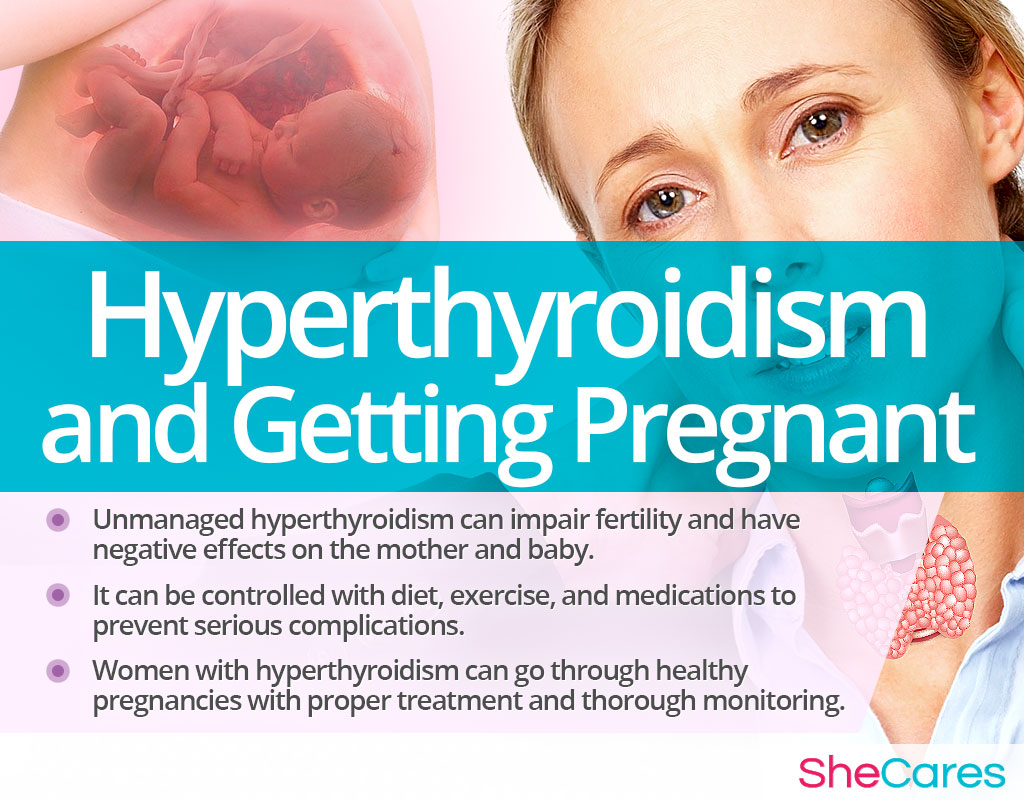Brief Overview of Hyperthyroidism
The most common cause of hyperthyroidism is an autoimmune condition, called Graves' disease. It triggers the body to produce an antibody, called thyroid-stimulating immunoglobulin (TSI), which leads to an overproduction of thyroid hormone. So, women with hyperthyroidism have high levels of thyroid hormones and low TSH (thyroid stimulating hormones).
The symptoms of an overactive thyroid might include chest palpitations, heat intolerance, unintentional weight loss, and mood swings.
Possible Effects of Hyperthyroidism on Pregnancy
Effects of Hyperthyroidism on Fertility
Getting pregnant with hyperthyroidism might be challenging for some women because thyroid hormones are necessary for the proper functioning of the ovaries and the maturation of the egg. Their imbalance might cause:
Menstrual cycle abnormalities, such as infrequent, long, or heavy periods, might make it more difficult to get pregnant.
Ovulation disturbance might occur even if a woman has regular periods and might lead to infertility.
Effects of Hyperthyroidism on the Mother and Baby
An overactive thyroid during pregnancy can increase the risk of a thyroid storm, an abrupt and potentially life-threatening worsening of the symptoms. Maternal hyperthyroidism that was treated with radioactive iodine or surgery can sometimes result in fetal hyperthyroidism because the antibodies might cross the placenta.
High thyroid levels during pregnancy can also impair baby's growth, leading to low birth-weight, tachycardia, and thyroid dysfunction.
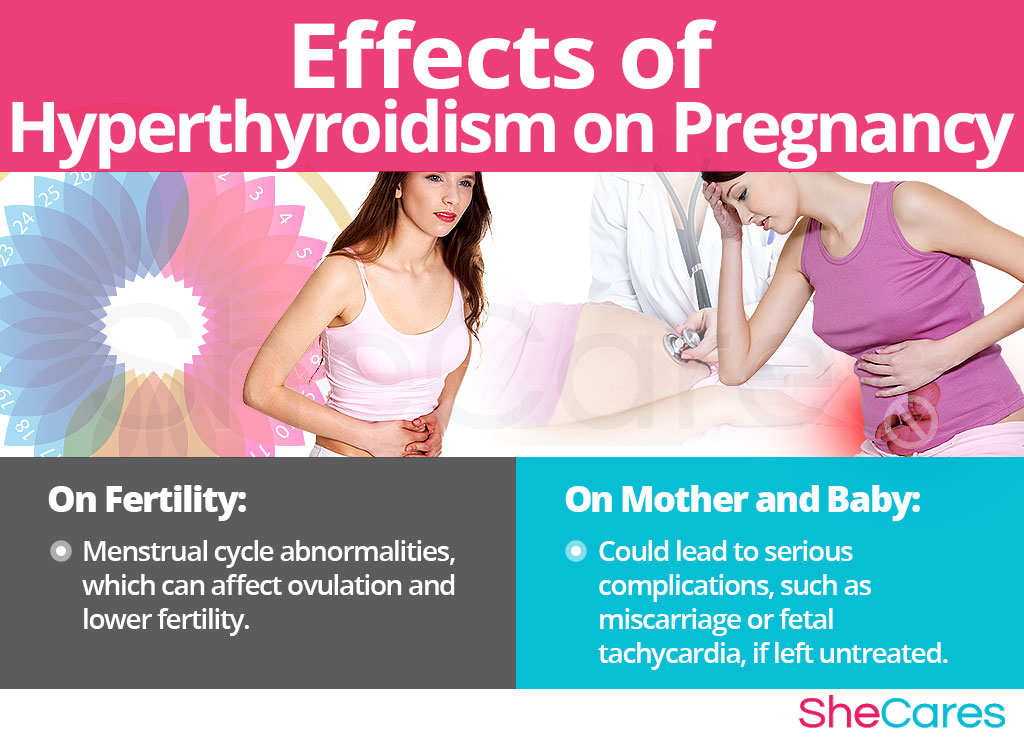
Risks and Complications
Uncontrolled hyperthyroidism might lead to preeclampsia, maternal heart failure, preterm delivery, miscarriage, or stillbirth.
Action Plan
Control Hyperthyroidism before Pregnancy
Your goal before getting pregnant is to stabilize your thyroid and reproductive hormones to regulate your menstruation and increase your chances of getting pregnant.
Treatment
In most cases, managing hyperthyroidism involves one of the following treatment options:
Antithyroid medications can effectively balance thyroid hormones, but have to be carefully selected as some might be harmful during pregnancy.
Radioactive iodine is used to destroy the thyroid gland so it does not overproduce hormones. After radioactive iodine treatment, pregnancy should be delayed for six to 12 months to prevent serious complications.
Surgical removal of the thyroid gland or its parts leads to hypothyroidism, which is generally easier to manage with medications.
Healthy Diet
Keep a low iodine diet to provide your body with necessary nutrients, prepare it for pregnancy, and minimize the symptoms of hyperthyroidism. Focus on the following foods:
Cruciferous foods can help suppress an overactive thyroid gland: broccoli, kale, cauliflower, or cabbage
Phytoestrogenic foods can balance reproductive hormones and boost fertility: tomatoes, flaxseeds, and lentils
Vitamin D-rich foods can nurture the thyroid gland and improve your fecundity: salmon, mushrooms, and eggs
Omega-3-packed foods are beneficial for conception and support the thyroid gland: nuts, avocado, and sacha inchi oil
Lean protein can prevent weight loss due to hyperthyroidism and sustain muscle mass: turkey and cooked, low-in-mercury fish, like salmon or catfish
Diary in moderate amounts will strengthen the bones and prevent thyroid-induced osteoporosis: full-fat yogurt, milk, or cottage cheese
Plenty of water will improve your cervical mucus and enhance conception.
Avoid soy products, such as soy milk or tofu, as they have been shown to worsen the symptoms of hyperthyroidism and interfere with radioactive iodine treatment.
Vitamins and Supplements
Prenatal vitamins are full of essential nutrients, such as folic acid, needed to prepare your body for conception and support a healthy pregnancy. Learn more about prenatal vitamins.
Hormone-regulating supplements, such as Macafem, can boost your libido, alleviate hormonal imbalance, and increase your odds of getting pregnant.
CoQ10 has been found helpful in boosting fertility and nurturing the thyroid gland.
B-complex, particularly vitamin B12, can alleviate the symptoms of an overactive thyroid.
L-carnitine might be effective in reducing the symptoms of hyperthyroidism and improve fertility.
Adequate Exercise
Exercise is beneficial in managing hyperthyroidism and improving fertility as it increases blood flow to key reproductive organs.
- Keep your exercise regimen at a moderate level and avoid over-exercising to prevent palpitations and other unwanted symptoms.
- Opt for 30 minutes, at least 5 times a week of any type of physical activity, such as jogging, bike riding, or swimming.
Good Habits
Quit alcohol and cigarettes to avoid pregnancy complications.
Limit your intake of coffee and other caffeinated beverages to prevent a rapid heartbeat.
Acupuncture has shown effective in treating imbalances of reproductive and thyroid hormones.
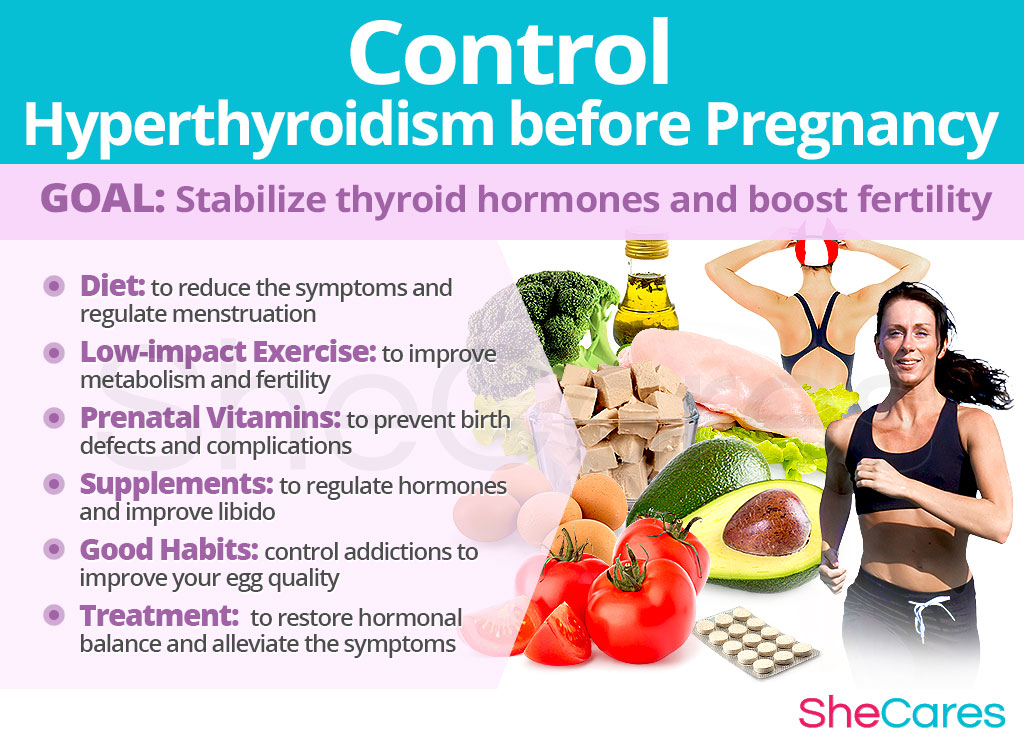
Tips for Conceiving with Hyperthyroidism
You can start your attempts to conceive when your thyroid hormone levels are stable and within a normal range. For some couples, it can take several ovulation cycles. So, to get through this time with ease, remember the following:
Stress leads to elevated cortisol levels, which can inhibit your fertility. So, find your optimal way to reduce anxiety and stay calm through yoga, massage, or finding a hobby.
Stay active, spend time outdoors, and surround yourself with friends and family for emotional support.
Focus on foods that improve egg's health and ovulation, such as berries, pumpkin and sesame seeds, salmon, and dark leafy veggies.
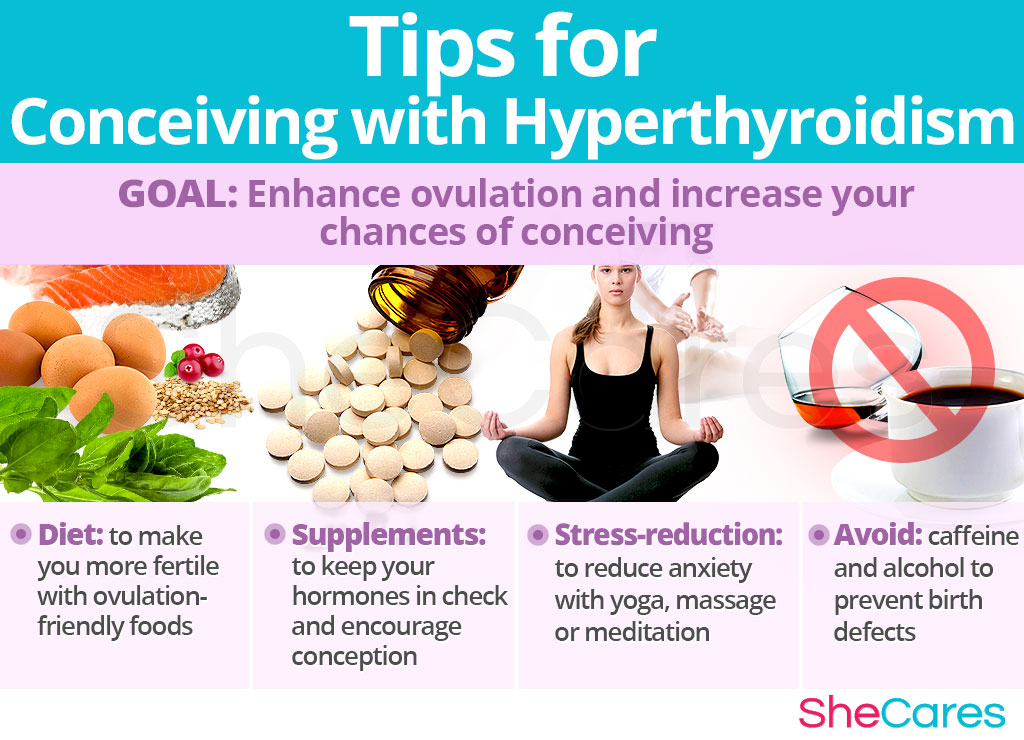
Manage Hyperthyroidism during Pregnancy
Thyroid hormones naturally increase during pregnancy. So, it is imperative to maintain regular doctor's check-ups, undergo a thyroid function test, and make medication adjustments, if necessary.
Maintain your preconception action plan, get enough rest, and consider prenatal yoga to keep your stress levels in check.
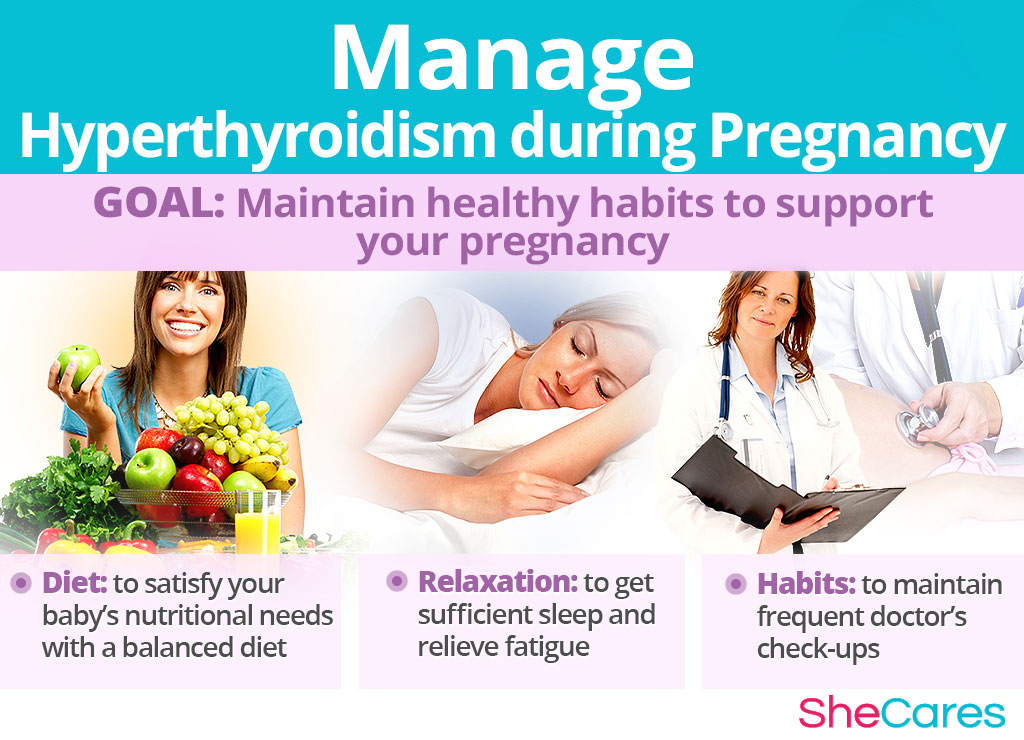
Key Takeaways
Undeniably, hyperthyroidism and getting pregnant are challenging topics for the mothers-to-be as well as their doctors. The risk of complications often forces women to delay their pregnancies and increases their anxiety, both of which negatively affect their chances of conception. But current medicine offers numerous solutions for hyperthyroid females, which -when combined with a thyroid-supporting diet and supplements like Macafem - can prevent their disorder from restricting their chances for motherhood.
Sources
- American Thyroid Association. (n.d.) Pregnancy and Thyroid Disease. Retrieved November 24, 2017 from https://www.thyroid.org/thyroid-disease-pregnancy/
- American Thyroid Association. (2017). Low Iodine Diet. Retrieved November 24, 2017 from https://www.thyroid.org/low-iodine-diet/
- British Thyroid Foundation. (n.d.). Pregnancy and Fertility in Thyroid Disorders. Retrieved November 24, 2017 from http://www.btf-thyroid.org/information/leaflets/38-pregnancy-and-fertility-guide
- Iranian Journal of Reproductive Medicine. (2015). Thyroid dysfunction and pregnancy outcomes. Retrieved November 24, 2017 from https://www.ncbi.nlm.nih.gov/pmc/articles/PMC4609317/
- Journal of Sexual Medicine. (2011). Hyperthyroidism: a risk factor for female sexual dysfunction. Retrieved November 24, 2017 from https://www.ncbi.nlm.nih.gov/pubmed/21679305
- March of Dimes. (n.d.). Thyroid conditions. Retrieved November 24, 2017 from https://www.marchofdimes.org/complications/thyroid-conditions.aspx
- National Institute of Diabetes and Digestive and Kidney Diseases. (2012). Pregnancy & Thyroid Disease. Retrieved November 24, 2017 from https://www.niddk.nih.gov/health-information/endocrine-diseases/pregnancy-thyroid-disease
- Therapeutic Drug Monitoring. (2006). Thyroid Function Testing in Pregnancy and Thyroid Disease: Trimester-specific Reference Intervals. Retrieved November 24, 2017 from https://www.ncbi.nlm.nih.gov/pmc/articles/PMC3625634/
- Thyroid. (2011). Guidelines of the American Thyroid Association for the Diagnosis and Management of Thyroid Disease During Pregnancy and Postpartum. Retrieved November 24, 2017 from https://www.ncbi.nlm.nih.gov/pmc/articles/PMC3472679/
